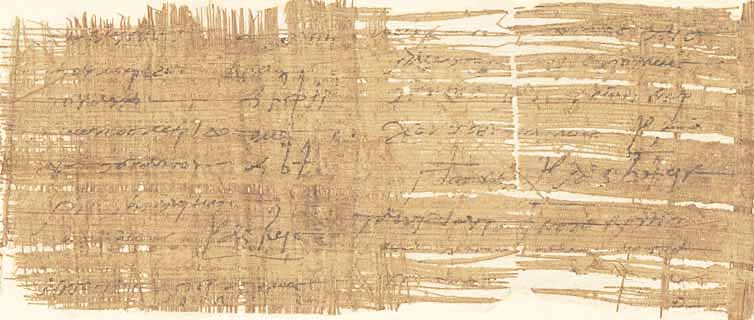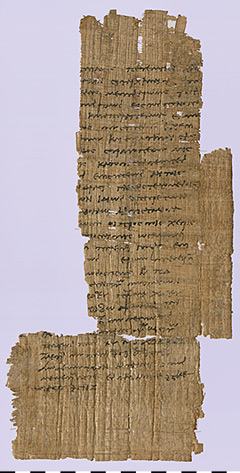UPZ II 209 (P. 5849 + P. 5850)
War costs money. So it is not surprising that among the many papyri in the Berlin Papyrus Collection there are also texts dealing with the payment of mercenaries. In addition, the text presented here contains further interesting details.
The papyrus was purchased by the diplomat, orientalist and collector Edward Thomas Rogers in 1881 and entered the Berlin Papyrus Collection shortly afterwards. The object is said to have been found in the Fayum, but probably originates from the Panopolites much further south or even from Thebes in Upper Egypt, as can be concluded from its content. Based on the date at the end of the text, it can be dated to 28 July 129 BC.
The writing on this papyrus takes the form of a letter in which Peteminis is asked by Asklepiades to pay a mercenary troop of 84 infantrymen their wages in money and wheat for the months of Pachon (May/June) and Pauni (June/July) that have just passed. The functions of these two persons are not mentioned, but they are probably to be located in the military and financial administration. Peteminis, whose name includes the main god of Panopolis, Min, can probably be assumed to have been a higher financial official in this city or in the nome Panopolites, since he is said to arrange the high payment mentioned. About the mercenary force, besides its strength, it is reported in the text that it was under the epistrategos of the Thebais, Paos, and under the command of Inaros was apparently detached from the northern town of Antaioupolis to the nome Panopolites in order to suppress a rebellion, which is not explained in more detail.
Interesting is the detailed calculation of the sum of money and natural goods written under the letter by another hand on this papyrus. For the two months of Pachon and Pauni, four talents and 4500 drachmas in cash are estimated for the mercenaries. In kind, the mercenaries need 82 artabas of wheat. They have apparently already received 25 of these in Antaioupolis. So there are still 57 artabas to be given. From this it can be calculated that each mercenary should receive one artaba (approx. 30 kg) of wheat per month in kind and 350 drachmas in cash. The money consisted of the actual pay and a grain purchase allowance. This corresponds to the pay of infantrymen, which has been handed down from other texts of that time, but is considerably less than that of mounted mercenaries.
The importance of this document lies not only in its content and the details we learn about the remuneration of mercenaries. Moreover, texts from the Panopolites from Ptolemaic times are very rare. Above all, however, the historical context in which this text must be placed is very interesting. The riot mentioned must have been part of the civil war between Ptolemy VIII Euergetes II and his sister Cleopatra II for the royal throne. The epistrategos Paos mentioned was an important partisan of Ptolemy. It remains unclear, however, whether the revolt as a derogatory term referred to Cleopatra’s party or even to the Egyptian revolt of Harsiesis, who for a short time also controlled the territory of the Panopolites, among others, and thus stood in the way of the king advancing southwards.
This papyrus about the remuneration of a troop was on display in the special exhibition „Akhmim – Egypt’s Forgotten City“.



